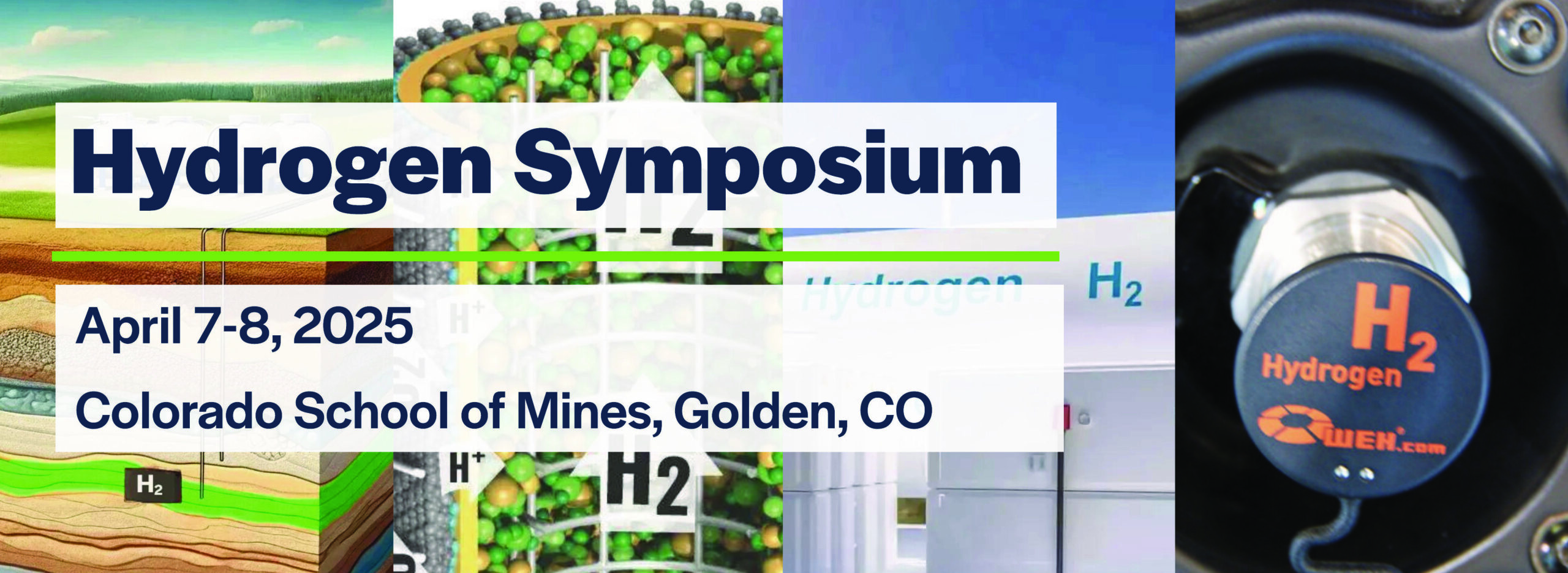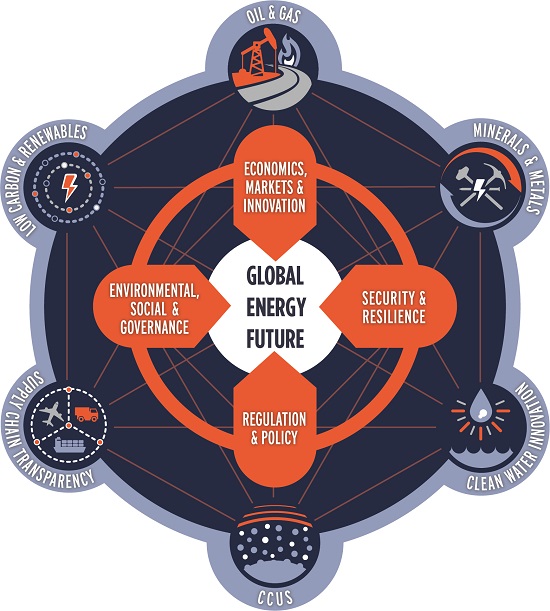Global Energy Future Initiative
Connecting energy innovators,
industry leaders and policy makers
to advance scientific, data-driven solutions
for the global energy future
Upcoming Events
Hydrogen Symposium
Join us for a Hydrogen Symposium at the Colorado School of Mines on Monday and Tuesday, April 7-8, 2025. Hear from high level industry and national lab researchers on the current landscape for hydrogen production, storage and utilization as well as the impact of hydrogen on energy infrastructure. Speakers and panels will address all phases of hydrogen innovation—geologic hydrogen, storage & transport, combustion & end utilization, fuel cells and electrolyzers. Plus research spotlights on cutting edge work being done in these areas!

The Future of Energy is Now, at Mines
Join the Mines Global Energy Future Initiative as we bring together global energy thought leaders and world-class Colorado School of Mines faculty through research, education, workshops, seminars and outreach.

Why Mines Global Energy Future Initiative?
Governments and industry around the globe are pursuing increasingly ambitious initiatives to reduce greenhouse gas emissions and diversify their energy portfolios, all while the world is facing significant growth in energy demand from emerging and developing economies. On these complex issues, Mines has a unique combination of expertise with the depth to meet the energy challenges head on. Mines has an exceptional track record of solving tough scientific and engineering problems across the gamut of energy and environmental fields. The university enjoys a hard-earned reputation as an unbiased problem-solver in disciplines often at odds in the energy-environment discussion; the university tagline, “Earth, Energy, Environment” is an accurate reflection of our expansive and growing purview.
With partners from academia, industry, government, and civil society galvanized by Mines’ uniquely comprehensive expertise, we’re developing energy solutions that will shape decision-making, now and in the decades to come.
Impactful Hubs

Low Carbon and Renewable Energy
Developing renewable, secure, resilient, and adaptive energy infrastructure that fosters economic growth while reducing environmental impact
Carbon Capture Utilization & Storage (CCUS)
Multidisciplinary approach to scientific, engineering and policy research on net zero emissions technological innovations
Clean Water Innovations
Role of technology innovation in reimagining global water in the future energy system
Minerals & Metals
Finding solutions to meet the minerals and metals needs to create our future energy system, including sustainable mining practices; technological innovations in mining; and the role of markets, economics and policy
Oil and Gas
Designing interdisciplinary research focused on the science, engineering and policy of oil and gas in the net-zero energy future
Supply Chain Transparency
Understanding how the future energy system will impact the global supply chain and the associated effects on markets, communities and the environment
Latest News
Electrification of the joint force: Challenges and opportunities for competition in the Pacific and Arctic theaters 1/17/2025
Electrification of the joint force: Challenges and opportunities for competition in the Pacific and Arctic theaters
Joshua D. Simulcik, Fabian E. Villalobos, and Payne Institute Director Morgan D. Bazilian write about how the US Department of Defense will have to find ways to expand the portfolio of its energy sources, continue to refine its supply chains and delivery mechanisms for energy services, improve efficiency across systems, and maintain a focus on costs to increase growing demand for energy services on the battlefield. January 17, 2025.
A new frontier in the voluntary carbon market: Old, leaky oil wells 1/16/2025
A new frontier in the voluntary carbon market: Old, leaky oil wells
Payne Institute Energy Finance Lab Director Brad Handler contributed to this article about how over the last two years, developers have generated roughly 5 million carbon credits from cleaning up orphaned oil and gas wells. If disused wells remain unplugged — the term of art for closing them up with concrete and remediating the environment around them — they can leach toxic chemicals and spew planet-warming methane into the air. January 16, 2025.
The 2025 Economic Report of the President
The 2025 Economic Report of the President
A Payne Institute article from Fellow Alex Gilbert, Director Morgan Bazilian, and Samantha Gross titled “The Emerging Global Natural Gas Market and the Energy Crisis of 2021-2022” was cited in the 2025 Economic Report of the U.S. President. January 10, 2025.
Mines professor working to slow methane leaks in natural gas production
Mines professor working to slow methane leaks in natural gas production
Payne Institute Faculty Fellow Dorit Hammerling co-founded Energy Emissions Modeling and Data Lab (EEMDL) to directly implement processes to detect and stop natural gas leaks, and to provide accurate data and modeling on the greenhouse gas emissions occurring across energy supply chains. January 9, 2025.
BP’s largest terminal in Azerbaijan hit gas-flaring record in 2024
BP’s largest terminal in Azerbaijan hit gas-flaring record in 2024
Payne Institute Earth Observation Group provided the flaring data for BP’s largest terminal in Azerbaijan, Sangachal, which flared record-breaking amounts of gas in 2024 with their VIIRS Nightfire service. This data is based on Suomi NPP satellite imagery gathered by NASA/NOAA/US Defence Department, which uses infrared imaging to detect gas flaring. January 9, 2025.
Why Mines?
Since 1874, Mines has been a pioneer at the frontiers of science and engineering, from locating and recovering earth resources, to energy production, to environmental stewardship.
Over time, Mines’ expertise expanded to meet the changing needs of industry and society, playing key roles in the growth of the global energy and natural resource industries. We are now positioned to leverage that deep expertise through a data-driven approach to informing the global energy future, in collaboration with academia, industry, government and civil society partners.
Leadership
John Bradford
Vice President for Global Initiatives
For more information about the Mines Global Energy Future Initiative at the Colorado School of Mines, please contact our Director, John Bradford, at jbradford@mines.edu.
Mines@150
As Colorado School of Mines approaches our sesquicentennial, we are ideally suited to lead this initiative. Our bold and ambitious MINES@150 strategic plan builds on the exceptional legacy of our PAST, the ways we impact the PRESENT and the POSSIBILITIES of our global energy future.











